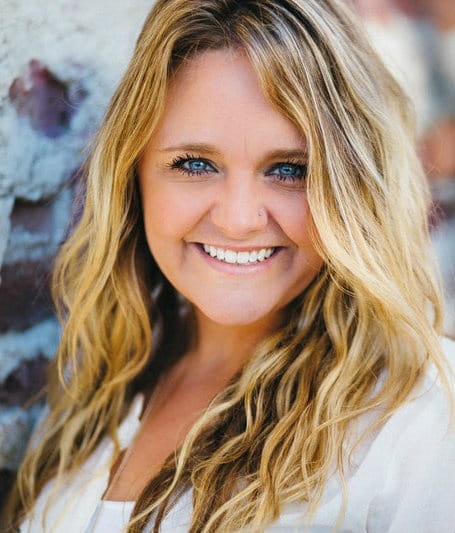
Several months ago, my husband and I adopted a 1-year-old beagle, Roger. We had some idea of what life was like for him in the year before he joined our family, but we don’t know the entirety of the story. In the months since Roger has been with us, I’ve wondered how his past has contributed to the pronounced anxiety he displays today.
On the nights when Roger is invited on our bed, he wants to sleep so close to me that he will actually lay his body on top of mine and then slowly slide down onto the bed, so that he couldn’t possibly be any more “next to” me. I appreciate his cuddles for a while, and then I need my space. An entire night like this almost always results in a cramped and overheated evening of “sleep.” I’ll usually move him away from me so I can fall asleep, but it seems to be a part of his anxiety that leads him to need feeling close and protected.
Several years ago, I had a co-worker who turned into a good friend. We connected in our faith, our humor, and our love of Chicago’s deep-dish pizza. The more time we spent together, the safer we felt in our friendship.
Like Roger, I did not know my friend during the first two and a half decades of her life. While I had heard some of her stories, there were certainly experiences she’d had that I was unaware of. I couldn’t have known all of her emotional wounds, fears, and anxieties—but this is friendship, isn’t it? We learn about one another and journey together, in hurts and in healing.
When Boundaries Aren’t Established in the Beginning, They Are Harder to Define Later On
As time went on, our friendship became increasingly taxing on me, particularly as my friend began working through some intense familial issues. I realized that boundaries were non-existent in our relationship. Giving myself some space, as I do when Roger is sleeping soundly on top of me, felt impossible. My friend needed far more than I could give her, and I was being depleted.
My friend’s increasingly depressive and sensitive state had me feeling as if I was constantly walking on eggshells. She was quick to get jealous or offended, and I was regularly feeling responsible for her bad days. I would spend hours with her as she wept and shared that which she was struggling with. Her struggles were legitimate—it’s the idea, subconscious or not, that I could fix her struggles that was insubstantial.
The thing is, I cared about my friend—I still do. Her depression and co-dependency made our friendship a difficult one for me, but I didn’t want to leave her to face painful circumstances alone. This, I suppose, is why I wasn’t more diligent at setting boundaries. If she saw her options for a support system as being nobody or myself, then I wanted her to have me.
You Are A Friend, Not A Savior
Those limited options, however, were never actually the case. In reality, she probably needed a therapist and she definitely needed a whole lot of Jesus. I wasn’t qualified to help her heal from all that her past held because I’m not a trained counselor or the God of the Universe. She needed a friend—of course—but the role I was in didn’t feel like friendship. I wasn’t given the opportunity to share my experiences with her, and every phone call or text message from her felt heavy and dire. Something had to change.
And it did. In a somewhat unexpected turn of events, I moved away to pursue a master’s degree. My friend and I each made valiant efforts to keep in touch, but the distance between us made it difficult. I felt guilty for feeling freed from the pressures of the friendship.
Not long ago, I ran into this friend again. It was a sweet reunion filled with much laughter and reminiscing. I could hardly believe this was the same woman I had sat with through trials and tears just a few years prior. She was…happy. She was seeing a therapist, active in her church, and had a fantastic set of friends. So much healing and redemption had taken place in her world—it felt as if I was with a new woman living in the same body.
Direct Your Friend to Resources, Don’t BE the Resource
This had been a tremendously difficult relationship for me. However, I don’t think it’s that my friend was an overly difficult person as much as she was a hurting person. Isn’t that most often the case when we are working, living, or in relationship with a “difficult” person? I couldn’t offer her all the help she needed during the time we were close friends, and I know that, had I not moved away, something would have had to change in our relationship. I needed to set some boundaries, care for myself, and love her in a way that would direct her towards the help she needed. I was exhausted and full of angst by the time I moved away from her, but it changes things to know that she was hurting and, therefore, difficult to be around. She was not just difficult.
I think of anxious little Roger. He came to us with difficult experiences and potent fears that have a very real impact on our lives. He does not curl up on my back and attempt to sleep there for eight hours just to be an annoyance; he’s trying to heal from patterns of abuse that made him feel unsafe or unwanted. I love being a presence in his life that offers him the kind of love he needs, even if it can be taxing (and even if my husband thinks I’m crazy for loving this dog like he’s my own child).
We’re around hurting people all the time. They can be difficult in every sense of the word—but that is not all they are. They are wounded, anxious, or scared. Through this, I have seen how important it is to set up boundaries in a relationship; “I can’t” can actually be important, kind, and empowering words in a friendship like the one I was in.
Remain Prayerful—This is Holy Work
And—and, what an honor. What holy work it is to be chosen to love a hurting person through some of their most difficult seasons of life. God knows I have and will need people who will stay with me when I’m ornery and defensive, through seasons when I feel helplessly defeated.
It takes work, pushback, thick skin, and Jesus, but loving the difficult and hurting people around us can lead to cultivating real change in their lives. We are not responsible for their full healing and restoration, nor do we comply with any abuse or mistreatment; but we can spend some time listening, encouraging, and allowing a chance for them to rest in our presence (or on our back).
When our friends are struggling and the friendship becomes burdensome:
- Set boundaries in the relationship
- Pray for your friend
- Receive prayer, as you are standing in the gap with and for your friend
- Direct your friend to helpful resources (therapist, doctor, pastor, etc.)
- Speak the truth—express your care for your friend and your limitations as a friend
- Refuse any guilt that is not yours to carry









